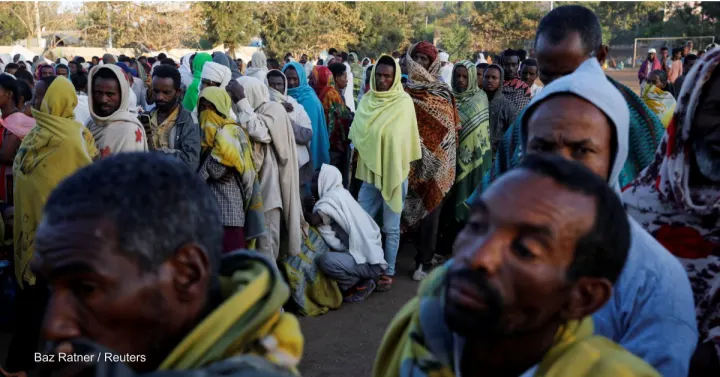By Teklehaymanot Weldemichel
USAID and WFP’s recent announcement of suspension of food assistance in Ethiopia’s Tigray region due to theft and reselling will most certainly lead to a worsening of the situation for millions experiencing acute food insecurity in the north of the country. While those profiteering from these thefts must be investigated, the U.S. government and international humanitarian groups cannot lose sight of the crucial role of food aid in creating the conditions for a successful peace process in the region.
The catastrophic two-year conflict that started in 2020 in the Tigray region, identified as one of the world’s deadliest wars in recent times, has been characterized by organized massacres, industrial-scale campaign of sexual violence, and indiscriminate bombing and shelling of crowded towns and villages across the region.
It is likely that millions of people have been forced into famine and near famine-like conditions, although lack of aid groups’ access to people affected by the crisis makes an accurate assessment difficult.
These conditions were deliberately orchestrated through the destruction and systematic looting of civilian properties and infrastructures, a brutal siege, and a blockade on basic services including banking, transport, and telecommunications. These in turn resulted in the collapse of the health care system and other civilian services and left nearly 90% of the population in dire need of humanitarian assistance.
One of the worst aspects of the Tigray conflict was the brutal siege which prohibited commerce in and out of the region and denied access to humanitarian organizations. Researchers estimated in March 2022 that hundreds of thousands had perished from starvation and lack of health care.
A peace agreement between the Ethiopian government and the Tigray People’s Liberation Front signed in November 2022 aimed for a cessation of hostilities and to end restrictions on aid, effective immediately.
While there has been some tentative and limited progress in the resumption of services, including the provision of humanitarian assistance and transport, it is still likely, given it is the lean agricultural season and the inadequate levels of grain and fertilizer available, that acute food insecurity levels have reached emergency and catastrophe levels in the region.
In addition, millions of people have been internally displaced over the course of the war across Tigray and new displacements continue as large parts of the region remain under the occupation of Eritrean forces and ethnic militia from the Amhara region of Ethiopia who have been credibly accused of ethnic cleansing and crimes against humanity.
Against this backdrop, the U.S. Agency for International Development and World Food Programme recently announced the suspension of food assistance in Tigray indefinitely, following preliminary investigations revealing theft and sale of food aid on the private market by some groups on the ground. The U.N. resident coordinator noted that investigation results will be finalized by June after which the decision of whether to continue humanitarian assistance or not will be made.
While the alleged criminal activities are undoubtedly reprehensible, it is nonetheless difficult to justify the abrupt and startling decision by the two largest humanitarian agencies operating in Tigray to pause food assistance to 5.4 million people in dire need of food aid.
Such deplorable profiteering is not uncommon in the aftermath of humanitarian crises across the globe. It was seen in Bosnia in 1999 or in recent years in Yemen, Haiti, and Sudan on an analogous or even larger scale without inciting the suspension of humanitarian assistance to people in desperate need of lifesaving aid. In similar instances, the response has been to identify and address the wrongdoers, not the collective punishment of millions of people in dire conditions.
In the context of Tigray, it is widely known that civilian administration and law enforcement have been severely undermined by catastrophic war. The black market and informal trading have been the primary mechanism of survival for many in the absence of transport in the region and the blockade on services. The peace-building process following the peace agreement has been slow with some encouraging milestones. Most notable in this regard has been the setting up of an interim administration charged with the mammoth task of overseeing and facilitating the process in March 2023, mere weeks before this decision to halt humanitarian assistance was made.
This reality is known to humanitarian organizations on the ground, as are the possible ramifications of an albeit temporary pause in humanitarian assistance. In addition to the millions of people in dire need of food aid — which does not allow time for investigations and reviews — the suspension of food assistance will have severe consequences for vulnerable groups.
And crime could increase as a result of a deterioration of living conditions and social cohesion. This could put women and girls, including survivors of widespread rape and sexual violence, at increased risk of further sexual exploitation.
Millions of children in northern Ethiopia who are just beginning to return to school after about three years and who have experienced complex trauma are expected to face further malnutrition and likely interruption of schooling as they are diverted to work to survive and support their families.
This suspension of humanitarian assistance comes at the beginning of the farming season in Tigray when many farmers need to focus on tilling land and planting for the first time in almost three years. The planting of land now would improve the food situation. Yet meeting the immediate food needs of their families will likely take primacy in the lives of smallholder farmers, hindering time and financial investments in farming needed to improve long-term food security in the region and support the rehabilitation of the agriculture and commercial sectors.
Finally, and perhaps most ironically, this cessation of aid risks the tenuous peace in the region and undermines efforts by the new interim administration to reestablish civilian administration and law enforcement structures.
It bears emphasizing that for over two years, the conflict in the region has resulted in the mobilization of hundreds of thousands of troops recruited in Tigray and neighboring regions. These forces can only be rehabilitated and reintegrated into civilian life if there is fast and effective peace building.
Exacerbating deprivation and diminishing trust in the abilities of various government stakeholders, including regional and federal administrations, as well as the good faith of international groups, can only severely undermine the peace process.
For these reasons, it is crucial for USAID and WFP to reassess their decision. Credible evidence of thefts by officials and aid workers should, of course, be investigated and prosecuted to the full extent of the law. The regional administration needs to work fully and in a transparent manner to support these efforts and to establish robust oversight and redress mechanisms that are accessible to international humanitarian organizations and implementing partners on the ground. Ensuring humanitarian aid rather than withdrawing it will help foster the environment needed to boost local administration capacity and ensure a transition to peace.
Finally, I conclude by highlighting the obvious. The primary objective of humanitarian aid is to save lives, alleviate suffering, and maintain human dignity. USAID and the U.S. government, and the international community through WFP and other agencies, have committed to these principles. Denying millions of lifesaving assistance is a betrayal of these principles that cannot be justified under any circumstance.
(Source: Devex)


